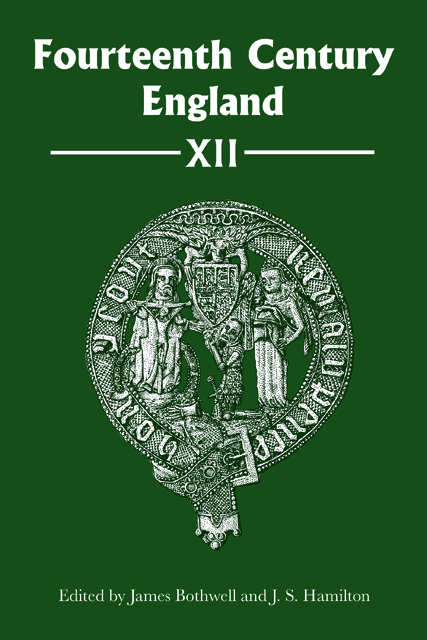47 results
Preface
-
- Book:
- Fourteenth Century England XII
- Published by:
- Boydell & Brewer
- Published online:
- 11 January 2023
- Print publication:
- 14 June 2022, pp xi-xii
-
- Chapter
- Export citation
Frontmatter
-
- Book:
- Fourteenth Century England XII
- Published by:
- Boydell & Brewer
- Published online:
- 11 January 2023
- Print publication:
- 14 June 2022, pp i-iv
-
- Chapter
- Export citation

Fourteenth Century England XII
-
- Published by:
- Boydell & Brewer
- Published online:
- 11 January 2023
- Print publication:
- 14 June 2022
Contents
-
- Book:
- Fourteenth Century England XII
- Published by:
- Boydell & Brewer
- Published online:
- 11 January 2023
- Print publication:
- 14 June 2022, pp v-vi
-
- Chapter
- Export citation
List of Illustrations
-
- Book:
- Fourteenth Century England XII
- Published by:
- Boydell & Brewer
- Published online:
- 11 January 2023
- Print publication:
- 14 June 2022, pp vii-viii
-
- Chapter
- Export citation
List of Contributors
-
- Book:
- Fourteenth Century England XII
- Published by:
- Boydell & Brewer
- Published online:
- 11 January 2023
- Print publication:
- 14 June 2022, pp ix-x
-
- Chapter
- Export citation
Abbreviations
-
- Book:
- Fourteenth Century England XII
- Published by:
- Boydell & Brewer
- Published online:
- 11 January 2023
- Print publication:
- 14 June 2022, pp xiii-xiv
-
- Chapter
- Export citation
Characterizing the Back-Contact Interface of Poly-Crystalline Cd(Se)Te Devices with XEDS, EELS, and HRSTEM
-
- Journal:
- Microscopy and Microanalysis / Volume 27 / Issue S1 / August 2021
- Published online by Cambridge University Press:
- 30 July 2021, pp. 742-744
- Print publication:
- August 2021
-
- Article
-
- You have access
- Export citation
3 - An Emotional Pragmatism: Edward III and Death
-
-
- Book:
- Monarchy, State and Political Culture in Late Medieval England
- Published by:
- Boydell & Brewer
- Published online:
- 06 October 2020
- Print publication:
- 18 September 2020, pp 39-70
-
- Chapter
- Export citation
Thomas W. Smith and Helen Killick , eds. Petitions and Strategies of Persuasion in the Middle Ages: The English Crown and the Church, c. 1200–c.1550. Woodbridge: York Medieval Press, 2018. Pp. 234. $99.00 (cloth).
-
- Journal:
- Journal of British Studies / Volume 59 / Issue 3 / July 2020
- Published online by Cambridge University Press:
- 24 July 2020, pp. 649-650
- Print publication:
- July 2020
-
- Article
- Export citation
Dorothy Jamieson. Willington and the Mowbrays: After the Peasants’ Revolt. Publications of the Bedfordshire Historical Record Society 95. Woodbridge: Boydell Press, 2019. Pp. 251. $34.95 (cloth).
-
- Journal:
- Journal of British Studies / Volume 59 / Issue 3 / July 2020
- Published online by Cambridge University Press:
- 24 July 2020, pp. 672-673
- Print publication:
- July 2020
-
- Article
- Export citation
The Revolution Stops Here? Leicestershire and the Rebellion of 1381
-
-
- Book:
- Fourteenth Century England XI
- Published by:
- Boydell & Brewer
- Published online:
- 14 September 2019
- Print publication:
- 21 September 2019, pp 155-182
-
- Chapter
- Export citation
Abbreviations
-
- Book:
- Ruling Fourteenth-Century England
- Published by:
- Boydell & Brewer
- Published online:
- 18 September 2019
- Print publication:
- 20 September 2019, pp ix-x
-
- Chapter
- Export citation
What's in a Title? Comital Development, Political Pressures and Questions of Purpose in Fourteenth-Century England
-
-
- Book:
- Ruling Fourteenth-Century England
- Published by:
- Boydell & Brewer
- Published online:
- 18 September 2019
- Print publication:
- 20 September 2019, pp 163-184
-
- Chapter
- Export citation
Contributors
-
- Book:
- Ruling Fourteenth-Century England
- Published by:
- Boydell & Brewer
- Published online:
- 18 September 2019
- Print publication:
- 20 September 2019, pp vii-viii
-
- Chapter
- Export citation
Introduction
-
-
- Book:
- Ruling Fourteenth-Century England
- Published by:
- Boydell & Brewer
- Published online:
- 18 September 2019
- Print publication:
- 20 September 2019, pp 1-20
-
- Chapter
- Export citation
Frontmatter
-
- Book:
- Ruling Fourteenth-Century England
- Published by:
- Boydell & Brewer
- Published online:
- 18 September 2019
- Print publication:
- 20 September 2019, pp i-iv
-
- Chapter
- Export citation
Index
-
- Book:
- Ruling Fourteenth-Century England
- Published by:
- Boydell & Brewer
- Published online:
- 18 September 2019
- Print publication:
- 20 September 2019, pp 293-307
-
- Chapter
- Export citation
Bibliography
-
- Book:
- Ruling Fourteenth-Century England
- Published by:
- Boydell & Brewer
- Published online:
- 18 September 2019
- Print publication:
- 20 September 2019, pp 289-292
-
- Chapter
- Export citation
Tabula Gratulatoria
-
- Book:
- Ruling Fourteenth-Century England
- Published by:
- Boydell & Brewer
- Published online:
- 18 September 2019
- Print publication:
- 20 September 2019, pp 308-308
-
- Chapter
- Export citation



